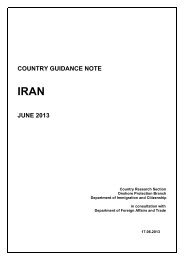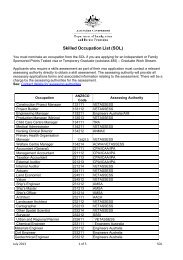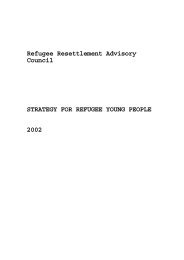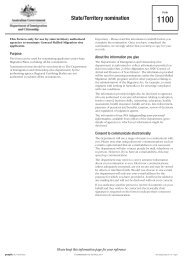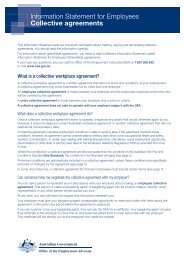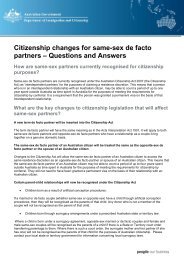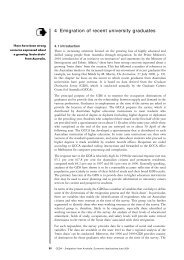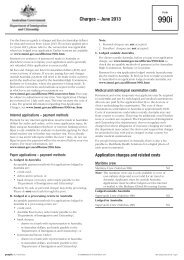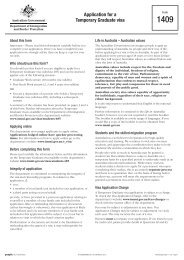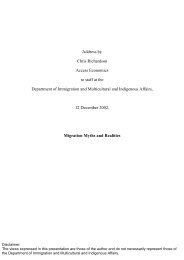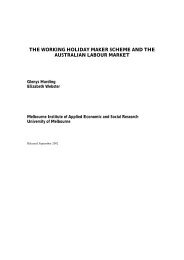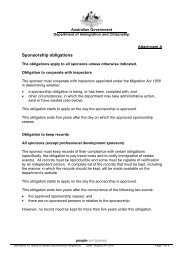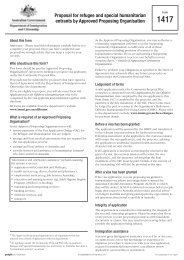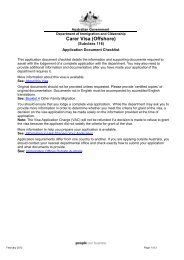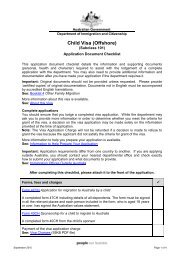Evaluation of the Integrated Humanitarian Settlement Strategy (IHSS)
Evaluation of the Integrated Humanitarian Settlement Strategy (IHSS)
Evaluation of the Integrated Humanitarian Settlement Strategy (IHSS)
You also want an ePaper? Increase the reach of your titles
YUMPU automatically turns print PDFs into web optimized ePapers that Google loves.
provide a range <strong>of</strong> short-term psychological and psychosocial interventions including counselling<br />
for survivors <strong>of</strong> torture and trauma<br />
provide training to a range <strong>of</strong> service providers including mainstream health services, general and<br />
specialised medical practitioners, settlement service providers, <strong>IHSS</strong> funded services and o<strong>the</strong>r<br />
relevant services to increase <strong>the</strong>ir awareness <strong>of</strong> refugee health needs and improve <strong>the</strong>ir ability to<br />
provide effective and appropriate services to this group<br />
provide advice, information products, consultancy and activities/initiatives to improve <strong>the</strong><br />
responsiveness <strong>of</strong> mainstream services to <strong>Humanitarian</strong> Service entrants’ health needs and<br />
access to health services.<br />
5.4.3 Issues raised in relation to EHAI<br />
The evaluation found that clients <strong>of</strong> this service were very satisfied with <strong>the</strong> support <strong>the</strong>y had received<br />
from EHAI providers, particularly <strong>the</strong> providers’ cultural sensitivity and understanding <strong>of</strong> <strong>the</strong><br />
experience <strong>of</strong> survivors <strong>of</strong> torture and trauma. The wide range <strong>of</strong> intervention strategies used by<br />
EHAI providers also reflected <strong>the</strong>ir sensitivity to <strong>the</strong> variety <strong>of</strong> cultural backgrounds and <strong>the</strong> potentially<br />
alien concept <strong>of</strong> face-to-face counselling for some clients. In addition, clients appreciated that EHAI<br />
providers adopted a holistic approach to <strong>the</strong> provision <strong>of</strong> <strong>the</strong>ir support by looking at and sometimes<br />
providing support concerning o<strong>the</strong>r aspects <strong>of</strong> <strong>the</strong> client’s settlement experience. While this is not<br />
really <strong>the</strong> role <strong>of</strong> <strong>the</strong> EHAI provider under <strong>the</strong> current model and it can <strong>of</strong>ten lead to duplication with<br />
some <strong>of</strong> <strong>the</strong> contract responsibilities <strong>of</strong> o<strong>the</strong>r <strong>IHSS</strong> providers, clients’ attraction to this style <strong>of</strong><br />
settlement service reinforces <strong>the</strong> need for case coordination in <strong>the</strong> <strong>IHSS</strong> model.<br />
Some issues emerged which relate in particular to <strong>the</strong> design <strong>of</strong> <strong>the</strong> EHAI service and its integration<br />
with o<strong>the</strong>r <strong>IHSS</strong> services and mainstream health services.<br />
Entrants’ immediate physical health needs<br />
The current system under <strong>the</strong> Migration Regulations for carrying out medical examinations <strong>of</strong><br />
humanitarian entrants before <strong>the</strong>y arrive in Australia does not ensure that any or all health problems<br />
are identified and addressed. Although undertakings to undergo fur<strong>the</strong>r specific medical checks upon<br />
<strong>the</strong> entrants’ arrival in Australia are <strong>of</strong>ten placed in entrants’ files, <strong>the</strong>re is no process for following up<br />
to ensure that this happens. Privacy considerations have meant that <strong>the</strong>re has not been an automatic<br />
transfer <strong>of</strong> information to <strong>the</strong> appropriate <strong>IHSS</strong> provider.<br />
Often humanitarian entrants have lived in camps for a considerable length <strong>of</strong> time and this frequently<br />
affects <strong>the</strong>ir health. Some, but not necessarily all, <strong>of</strong> pre-existing health problems, may be identified<br />
before leaving for Australia. Indeed, data from EHAI providers indicate that over 80% <strong>of</strong> EHAI clients<br />
need to be referred to a GP soon after arrival. This is supported by <strong>the</strong> longitudinal survey <strong>of</strong><br />
immigrants to Australia reported in Life in a New Land (National Institute <strong>of</strong> Labour Studies,<br />
commissioned for DIMIA, 2002) which found that humanitarian entrants were more likely than o<strong>the</strong>r<br />
migrants to have a pre-existing long-term health condition and to have suffered from a medical<br />
condition since arrival in Australia.<br />
Several stakeholders claimed that it is important from <strong>the</strong> point <strong>of</strong> view <strong>of</strong> public health interest that<br />
entrants are provided support as quickly as possible to follow up with treatment <strong>of</strong> any conditions <strong>the</strong>y<br />
may have acquired in <strong>the</strong> challenging conditions <strong>the</strong>y lived in before arriving in Australia. Many<br />
refugees have lived in areas where various diseases are endemic. Medical checks are carried out for<br />
48<br />
<strong>Evaluation</strong> <strong>of</strong> <strong>the</strong> <strong>Integrated</strong> <strong>Humanitarian</strong> <strong>Settlement</strong> <strong>Strategy</strong> 27 May 2003



